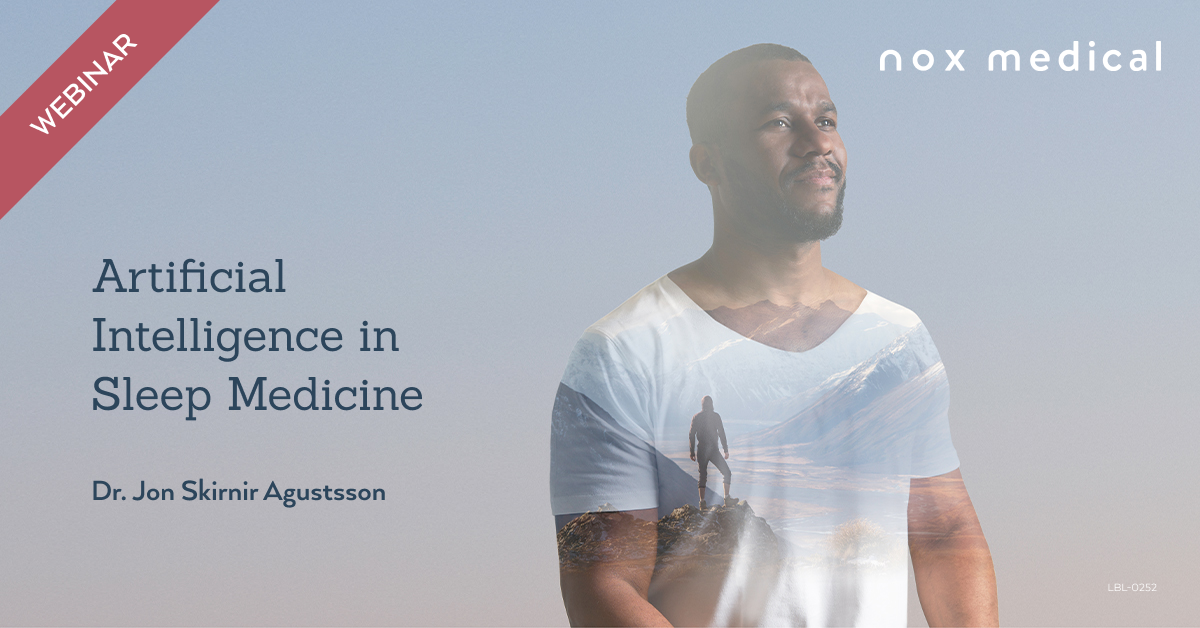Artificial Intelligence (AI) has become a common buzzword among the sleep industry, but is there more to it than just the hype? AI has penetrated the world of sleep medicine and has sparked important dialogue on how to best use new technologies in diagnosing and treating patients. In this session, Dr. Jon Skirnir Agustsson, Director of Analysis, Data and Research at Nox Research, will spearhead conversations around AI in sleep medicine to collectively discuss the artificial technology itself and how industry leaders can leverage it to help people with sleep disorders around the world.
This is the second session in Nox Medical’s three-part webinar series, Advancing Sleep Diagnostics Through Home Sleep Testing, where we look at the challenges facing home sleep testing, the reactions from diagnostic technology providers, the metrics to measure accurate sleep diagnosis, and how artificial intelligence (AI) in sleep diagnostics has taken the field by storm. We will interview both experts from Nox Medical along with experts in the field of sleep to focus on the urgent challenge we all face – to increase accessibility to good sleep diagnostics, ultimately supporting healthy sleep for all.
Artificial Intelligence in Sleep Medicine: An Industry Trend or Mainstay?
In recent years, artificial intelligence (AI) in medicine has gained traction and sparked ongoing conversations around the role of this new technology in diagnosing and treating patients. For sleep professionals, AI has shown tremendous potential to improve patient outcomes and to increase predictability through diagnostics. If developed properly, AI could be a significant player in helping people with sleep disorders throughout the world.
Are AI technologies the future of sleep medicine, or simply a trending buzzword? In this session, Dr. Jon Skirnir Agustsson, Director of Analysis, Data and Research at Nox Research, will spearhead conversations around AI in sleep medicine and discuss relevant topics such as the balance between AI and manual tasks, the role AI plays in distinguishing AHI in patients, and addressing potential pitfalls of integrating AI into sleep medicine, among other related subjects.
During Dr. Agustsson webinar, many pressing questions will be addressed, including:
- How can AI increase the data that we gather from a home sleep study?
- Can we find a balance between AI and manual tasks in sleep medicine?
- How can we get an accurate diagnosis using AI?
- How does using AI improve therapeutic compliance and health outcomes?
- What are the potential pitfalls of integrating AI into sleep medicine?
- What is the biggest benefit of AI powered diagnostics?
Dr. Jon Skirnir Agustsson, PhD.
Dr. Agustsson holds a masters degree in electrical engineering from the University of Iceland and a PhD in physics from Basel University in Switzerland. During his training and career, Dr. Agustsson has focused on metrology, the science of measurements, and data science. His career has spanned the measurements of the electrical properties of individual molecules, to developing novel technology to monitor pollution in water. Now he is a Director of Analysis, Data and Research at Nox Research, leading a team focused on developing novel methods of analysing data recorded during a sleep study. Nox Research is an interdisciplinary team of scientists working on advancing sleep medicine by collaborating with medical scientists, doctors, and other sleep researchers. The scientists at Nox Research have a strong background in AI, data science, and engineering. Furthermore, they have a deep interest in physiology and sleep medicine. This allows the team to communicate with sleep researchers and help build bridges between medicine and engineering. Nox Research is a part of Nox Medical with a focus on supporting sleep researchers with the goal of improving sleep medicine in the future. Nox Research operates in many ways like an academic research group by publishing its findings in conferences and scientific journals, participating in large sleep research projects, applying for research funding with competitive grants, and teaching students.
A recording from the session is now available here
Topic: Webinar





